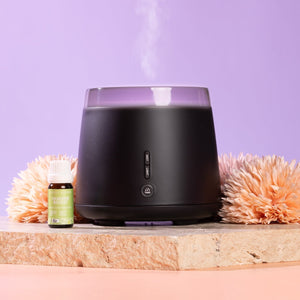Supporting Clear Breathing During Cold and Flu Season
Cold and flu season can truly test our respiratory systems, making clear breathing feel like a luxury. The familiar discomforts of sniffles, persistent nasal congestion, and coughing can significantly disrupt our daily lives. Fortunately, there are numerous natural and supportive strategies we can use to help our bodies manage breathing during cold and flu season.
This main content aims to provide helpful health tips and insights. It's designed to assist you in supporting your respiratory health effectively during these challenging months. We will explore practical ways to keep your airways open and functioning well.
Table Of Contents:
- Understanding the Impact of Colds and Flu on Breathing
- Natural Remedies for Supporting Clear Breathing
- Herbal Allies for Respiratory Health
- Essential Oils for Clear Breathing
- Lifestyle Habits for Respiratory Health
- Nutritional Support for Respiratory Health
- Managing Symptoms with Over-the-Counter Options
- Prevention is Key: The Flu Vaccine and Other Measures
- When to Seek Medical Help
- Conclusion
Understanding the Impact of Colds and Flu on Breathing
When cold and flu viruses invade our bodies, our airways frequently become the primary battleground. The body's natural response involves inflammation and an increase in mucus production, which, while protective, can narrow our breathing passages. This narrowing makes it more challenging for air to flow freely, leading to that all-too-familiar stuffy, congested feeling associated with a common cold or the flu virus.
These breathing difficulties can spill over into other areas of life, disrupting sleep, depleting energy levels, and contributing to an overall sense of being unwell when you're sick. Such common conditions can sometimes lead to symptoms worse than initially anticipated if not managed properly. Understanding how your body fights these invaders is the first step to supporting it.
For instance, chest congestion is a frequent complaint, often accompanied by a productive cough as the body tries to expel mucus. Knowing how to manage symptoms effectively can make a significant difference in your comfort and recovery. It also helps prevent complications like a secondary tract infection.
Natural Remedies for Supporting Clear Breathing
Several natural approaches can offer relief and help ease congestion, allowing you to take a deep breath more easily. These methods focus on soothing irritated airways and helping the body's natural healing processes. Staying healthy often involves using simple, accessible remedies.
1. Steam Inhalation
One of the most straightforward and effective methods to clear nasal congestion is steam inhalation. The warm, moist air generated helps loosen mucus trapped in the nasal passages and sinuses, and it can soothe irritated airways. This method is particularly beneficial if you're suffering from dry air in your home, which can exacerbate respiratory discomfort.
To try steam inhalation at home, carefully follow these steps:
- Boil water and then pour it into a large, heatproof bowl.
- Optionally, add a few drops of essential oils like eucalyptus or peppermint, known for their decongestant properties.
- Drape a towel over your head, creating a tent over the bowl, and lean over it, keeping a safe distance from the hot water.
- Close your eyes and breathe deeply through your nose for 5-10 minutes.
Repeating this process a few times a day can provide significant relief from congestion symptoms. For young children, ensure steam is not too hot and always supervise closely, or opt for a gentler approach like a warm bath or shower. Using a humidifier in your bedroom, especially at night, can also help add moisture to the air, keeping your nasal passages from drying out and helping to ease discomfort.
2. Saline Nasal Rinse
Flushing your nasal passages with a saline solution is another excellent way to combat congestion and improve nasal airflow. This practice, often done using a neti pot or a saline nasal spray, helps to wash away excess mucus, allergens, and irritants that can contribute to sinus congestion. It is a gentle yet effective method to manage symptoms of a cold or flu.
You can purchase pre-made saline sprays or easily make your own solution. To create a DIY saline rinse, dissolve about 1/4 teaspoon of non-iodized salt and a tiny pinch of baking soda in 8 ounces of lukewarm, previously boiled or distilled water. When using a neti pot or a bulb syringe, gently flush each nostril, tilting your head to allow the solution to flow through your nasal cavity and out the other nostril.
Incorporating a saline rinse into your daily routine, especially during flu season or when experiencing cold symptoms, can be very beneficial. It not only helps clear existing congestion but can also support overall nasal hygiene. This simple action helps your body fight irritants effectively.
3. Stay Hydrated
Drinking plenty of fluids is absolutely crucial when you're trying to fight illness and manage respiratory symptoms. Adequate hydration helps keep mucus thin and loose, making it easier for your body to expel it from your airways, which can aid a productive cough. When you're sick, it's easy to become dehydrated, which can make symptoms worse.
Aim to drink at least 8 glasses of water a day; more if you have a fever. Warm liquids can be especially comforting and beneficial. Consider hot drinks like herbal teas with a bit of honey honey (for adults and children over one year old), clear broths, or the classic chicken soup, all of which can soothe a sore throat and help ease congestion.
Staying hydrated plays a key role in supporting your body's natural defense mechanisms. Drinking plenty of water and other fluids supports overall good health and is vital when your body is working hard to recover. This simple step is fundamental for flu support.
4. Humidifiers for Moist Air
Dry air, common in heated indoor environments during colder months, can dry out your nasal passages and throat, aggravating cold and flu symptoms. Using a humidifier is an effective way to add moisture back into the air you breathe. This helps to keep your airways moist, which can soothe irritated tissues and ease congestion.
Maintaining an optimal humidity level (between 30-50%) in your home can make breathing more comfortable, especially when dealing with a runny nose or sinus congestion. It can also help loosen phlegm, making coughs more productive. Remember to clean your humidifier regularly according to the manufacturer's instructions to prevent the growth of mould or bacteria.
5. Warm Compresses
Applying a warm compress to your face can help alleviate the discomfort associated with sinus congestion and pressure. The gentle heat can help open up nasal passages and soothe tender areas around your nose, cheeks, and eyes. This is a simple yet effective way to find some relief when you're feeling stuffed up.
To make a warm compress, soak a clean washcloth in warm water (not too hot), wring out the excess, and apply it to your face for 5-10 minutes. You can repeat this several times a day as needed. This can be a calming part of your routine to feel comfortable while recovering.
Herbal Allies for Respiratory Health
Nature offers a wealth of plants that have traditionally been used to support respiratory health and boost immune function. Incorporating these herbal allies can be a gentle way to help your body fight illness. Many herbs possess properties that can ease cold symptoms and support your immune health.
1. Elderberry
Elderberry has a long history of use, particularly for its ability to bolster the immune system and combat colds and flu viruses. Scientific studies suggest that elderberry may help reduce the duration and severity of upper respiratory symptoms, including flu symptoms. You can typically find elderberry in various forms, such as syrups, gummies, or supplements, at health food stores or pharmacies.
Its antioxidant properties also contribute to overall good health. When flu season arrives, having elderberry on hand can be a helpful part of your flu support strategy. Always choose reputable brands and follow dosage recommendations.
2. Echinacea
Echinacea is another well-known herb celebrated for its immune-boosting capabilities, often used to help prevent and treat upper respiratory infections like the common cold. It is available in several forms, including teas, tinctures, and capsules. Many people start taking echinacea at the first sign of feeling unwell to help their body fight off impending symptoms.
While research results vary, many find it beneficial for shortening the duration of cold symptoms. It's a popular choice for those looking for natural ways to support their immune system. Consult with a healthcare provider if you have underlying health conditions or take other medications.
3. Thyme
Thyme is more than just a culinary herb; it possesses natural expectorant and antimicrobial properties that can be beneficial for respiratory health. As an expectorant, thyme can help loosen mucus in the airways, making coughs more productive and easing chest congestion. Its antimicrobial qualities can also help combat respiratory infections, including a tract infection.
Drinking thyme tea is a common way to access its benefits; simply steep fresh or dried thyme in hot water. Thyme essential oil can also be used in a diffuser, but should not be ingested unless specifically formulated for that purpose and under professional guidance. It helps soothe irritated airways.
4. Ginger and Garlic
Ginger and garlic are staples in many kitchens and are also powerful allies for immune health. Ginger has anti-inflammatory properties and can help soothe a sore throat and settle an upset stomach, which sometimes accompanies the flu. Garlic is renowned for its immune-boosting compounds, such as allicin, which has antimicrobial effects.
You can incorporate fresh ginger into teas or meals. Similarly, adding fresh garlic to your food can provide health benefits. These ingredients are easy to find and can be a tasty way to support your body fight illness.
Essential Oils for Clear Breathing
Essential oils, when used correctly, can be valuable for supporting respiratory health and easing congestion symptoms. Their aromatic compounds can help open nasal passages and create a sense of clearer breathing. Always use essential oils with care, dilute them properly, and be mindful of contraindications, especially for young children or individuals with specific health conditions.
1. Eucalyptus
Eucalyptus oil is widely recognized for its potent ability to open up airways and relieve congestion, making it a go-to for colds and flu. Its main component, eucalyptol, acts as a decongestant and can help loosen phlegm. Add a few drops to your steam inhalation bowl or a diffuser to disperse its benefits into the air.
You can also create a chest rub by mixing a few drops of eucalyptus oil with a carrier oil like coconut or jojoba oil. Gently massage this onto your chest and throat to help ease discomfort and promote clearer breathing. This can significantly help with chest congestion symptoms.
2. Peppermint
The menthol in peppermint oil provides a cooling sensation that can make you feel as though you're breathing more easily, even when congested. Peppermint oil also possesses antimicrobial properties that can be beneficial when dealing with respiratory ailments. Like eucalyptus, it can be used in steam inhalations or diffusers.
A diluted peppermint oil solution can also be applied topically (avoiding the face, especially near the eyes). Its invigorating aroma can also help you feel more alert when you're feeling sluggish from a cold. This helps you feel comfortable.
3. Tea Tree Oil
Tea tree oil is well-known for its powerful antimicrobial and anti-inflammatory properties, making it effective in helping to fight off the germs that can cause respiratory infections. It's particularly useful for clearing the air when diffused. You can also add a few drops to your hot shower; the steam will carry the aromatic vapors, creating a beneficial steam inhalation effect.
Due to its potency, tea tree oil should always be diluted before any topical application and should not be ingested. It can support your body's efforts to fight illness by creating a cleaner environment. Using it in a diffuser can help add moisture if your model supports it.
4. Lavender and Chamomile Oils
While not directly decongestants, lavender and chamomile essential oils offer calming and relaxing properties, which can be incredibly helpful when you're sick. A common cold or flu can make it difficult to rest, and these oils can promote relaxation and improve sleep quality. Better sleep, in turn, supports your immune health and recovery.
Diffuse lavender or chamomile in your bedroom before sleep. You can also add a few drops to a warm bath. These gentle oils can help ease discomfort and make the recovery process more bearable.
Lifestyle Habits for Respiratory Health
Beyond specific remedies, your daily lifestyle choices play a significant key role in maintaining respiratory health and bolstering your immune system against flu viruses and the common cold. Adopting these habits can help you stay healthy throughout flu season and beyond. These health tips are foundational for good health.
1. Regular Exercise
Engaging in moderate regular exercise is beneficial for overall health, including boosting immune function and improving lung capacity. Physical activity helps increase circulation, which allows immune cells to travel through the body more efficiently to fight infection. Aim for at least 30 minutes of activity like brisk walking, cycling, or swimming on most days of the week.
However, it's important to listen to your body. If you're feeling unwell, particularly with a fever or significant fatigue, it's best to scale back or rest until you're feeling better. Gentle stretching or a short walk might be appropriate if you have mild cold symptoms.
2. Stress Management
Chronic stress can take a toll on your immune system, making you more vulnerable to illnesses, including colds and flu. Finding effective ways to manage stress is crucial for staying healthy. Techniques such as meditation, yoga, deep breathing exercises, or spending time in nature can help reduce stress levels.
Incorporating stress-reduction practices into your daily routine can improve your resilience against infections. Even short periods of mindfulness throughout the day can make a difference. Support groups can also be beneficial for managing stress related to chronic conditions or general life pressures.
3. Proper Sleep
Adequate, quality sleep is fundamental for robust immune health and the body's ability to fight illness. During sleep, your body releases cytokines, proteins that help combat inflammation and infection. Aim for 7-9 hours of uninterrupted sleep per night to allow your body to repair and rejuvenate.
If nasal congestion or coughing makes sleeping difficult, try keeping your head elevated with an extra pillow. This can help drain nasal passages and reduce postnasal drip, allowing you to breathe more easily. A consistent sleep schedule also contributes to better sleep quality and helps you feel comfortable.
4. Diligent Hand Washing
One of the most effective ways to prevent the spread of cold and flu viruses is through frequent and thorough hand washing. Wash your hands with soap and hot water for at least 20 seconds, especially after coughing, sneezing, being in public places, or before eating. This simple act significantly reduces your risk of picking up or spreading germs.
If soap and water are not readily available, use an alcohol-based hand sanitizer that contains at least 60% alcohol. Make washing hands a regular part of your daily routine and encourage family members to do the same. Staying healthy starts with good hygiene.
5. Avoiding Respiratory Irritants
Exposure to respiratory irritants can exacerbate cold and flu symptoms and make breathing more difficult, especially if you have underlying conditions like asthma or lung disease. Common irritants include tobacco smoke, strong chemical fumes, dust, and outdoor air pollution. Try to minimize your exposure to these substances as much as possible.
Maintaining good indoor air quality is also important. Ensure proper ventilation, use air purifiers if necessary, and avoid using harsh chemical cleaners that can irritate your airways. This helps protect your nasal passages and lungs.
Nutritional Support for Respiratory Health
What you eat significantly impacts your immune system's ability to fend off infections and support respiratory health. A balanced diet rich in vitamins and minerals is essential, especially during flu season when your body needs extra support. Certain nutrients play a direct role in immune health and can help your body fight illness more effectively.
1. Vitamin C
Vitamin C is a potent antioxidant known for its immune-boosting properties. It supports the production and function of white blood cells, which are vital for fighting infections. Good dietary sources of Vitamin C include citrus fruits (oranges, lemons, grapefruits), berries, kiwi, bell peppers, broccoli, and leafy greens.
While Vitamin C may not prevent colds entirely, it can help reduce the severity and duration of cold symptoms. Consider increasing your intake of Vitamin C-rich foods when you're feeling under the weather. For some, a supplement may be beneficial, but food sources are always preferred.
2. Vitamin D
Vitamin D, often called the 'sunshine vitamin,' plays a critical role in immune function, and low levels have been linked to an increased risk of respiratory infections. Your body produces Vitamin D when your skin is exposed to sunlight. However, during winter months or for people who spend a lot of time indoors, it can be challenging to get enough.
Dietary sources include fatty fish (salmon, mackerel), egg yolks, and fortified foods like milk and cereals. Many people may benefit from having their Vitamin D levels checked by a doctor and considering supplementation if they are deficient. This is especially relevant for women's health, as some studies suggest a higher prevalence of deficiency.
3. Zinc
Zinc is an essential mineral that is crucial for the development and function of immune cells. It plays a key role in helping the body fight off invading bacteria and viruses. Good dietary sources of zinc include oysters, beef, poultry, pumpkin seeds, lentils, and chickpeas.
Zinc lozenges, when taken at the first sign of a cold, may help shorten the duration of symptoms like a sore throat or runny nose. However, it's important not to exceed recommended dosages for zinc, as high levels can have adverse effects. Focusing on food sources is generally the best approach for maintaining adequate zinc levels for good health.
4. Probiotics and Gut Health
A significant portion of your immune system resides in your gut, making gut health incredibly important for overall immune function. Probiotics, which are beneficial bacteria, help maintain a healthy balance of gut flora. Consuming probiotic-rich foods like yogurt, kefir, sauerkraut, kimchi, and kombucha can support your immune health.
A healthy gut microbiome can enhance your body's natural defenses against pathogens, including those that cause respiratory infections. If you are considering a probiotic supplement, consult with a healthcare provider to choose one that is appropriate for your needs. Supporting your gut is another way to help your body fight illness.
Managing Symptoms with Over-the-Counter Options
While natural remedies are excellent for support, sometimes over-the-counter remedies can provide necessary relief from bothersome cold and flu symptoms. Products like pain relievers (ibuprofen or acetaminophen) can help reduce fever, alleviate body aches, and soothe a sore throat. Decongestants can help with a stuffy nose, but should be used cautiously, especially if you have high blood pressure.
Expectorants can help loosen phlegm, aiding a productive cough and clearing chest congestion. Always read labels carefully, follow dosage instructions, and be aware of potential side effects or interactions with other medications you may be taking. These options can help you feel comfortable while your body recovers, but they don't cure the underlying flu virus or common cold.
If you're uncertain about which over-the-counter remedies are suitable for your specific congestion symptoms or chest congestion symptoms, consult a pharmacist or your doctor. They can offer medical advice tailored to your situation. It's important to manage symptoms effectively to avoid them getting worse.
Prevention is Key: The Flu Vaccine and Other Measures
Preventing illness in the first place is always the best strategy for staying healthy during flu season. One of the primary preventative measures recommended by public health officials is the annual flu vaccine. The flu vaccine helps your body develop protection against the most common flu viruses expected to be circulating each year.
While the effectiveness can vary, it can reduce the likelihood of contracting the flu and lessen the severity of illness if you do get sick. Beyond vaccination, consistent hand washing, using hand sanitizer when soap and water aren't available, avoiding close contact with sick individuals, and disinfecting frequently touched surfaces are all vital health tips. Staying informed about local flu activity can also help you take extra precautions when needed.
When to Seek Medical Help
While many cold and flu symptoms can be managed at home with natural remedies and self-care, it is important to recognize when symptoms might indicate a more serious condition requiring medical advice. Prompt attention can prevent complications, especially for vulnerable populations such as young children, older adults, or those with chronic health issues like lung disease.
You should contact a doctor if you experience any of the following:
- Persistent difficulty breathing or significant shortness of breath.
- Chest pain or pressure.
- A high fever (typically over 103°F or 39.4°C) or a fever that lasts for more than a few days or doesn't respond to over-the-counter medication.
- Symptoms that get worse instead of better after a week, or cold symptoms that persist for more than 10-14 days.
- Dehydration signs like dizziness, dry mouth, or significantly reduced urination.
- Worsening of chronic medical conditions.
For serious conditions like suspected bird flu (though rare, it causes severe respiratory illness) or if you're feeling extremely unwell, seek immediate medical attention. Remember, these remedies support your body's natural healing processes and are not a substitute for professional medical care when it is needed. Using an online symptom checker can sometimes offer initial guidance, but it should never replace consultation with a healthcare professional.
Conclusion
Supporting clear breathing and overall well-being during cold and flu season involves a multifaceted approach. By incorporating natural remedies like steam inhalation and saline rinses, staying hydrated by drinking plenty, and leveraging herbal allies, you can effectively manage symptoms and ease discomfort. Lifestyle habits such as getting proper sleep with your head elevated if needed, managing stress, regular exercise, and good nutrition further bolster your body's natural ability to fight illness and stay healthy.



















